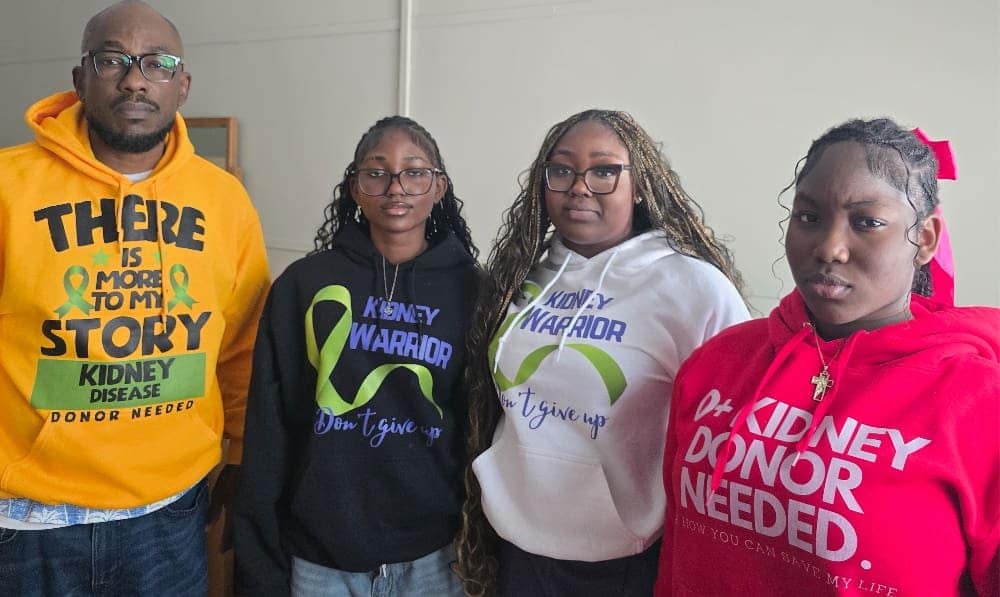As a cyber security engineer, Adewale Osiyale could work remotely from nearly anywhere. But after growing up in Nigeria and living in a few other metro Atlanta suburbs, he fell in love with Fayetteville three years ago.
“It’s the serenity. It’s a place you would love to grow your family,” said Osiyale.
He also praised the Fayette County schools attended by his daughters:
16-year-old Fiyin, who is entering Agnes Scott College after graduating early from Fayette County High School; 14-year-old Adun, a student at the same high school; and 12-year-old Fefe, a student at Bennett’s Mill Middle School.
“To make sure they reach their goals, having them go to the Fayette school system is one of the things that is fulfilling my dreams as well as theirs,” he said.
Around the time he moved to Fayetteville, Osiyale learned he had kidney disease. It has progressed to the point that he’s now on the list of people awaiting a kidney transplant.
Unlike many other organs, kidneys can be transplanted from living donors. Their transplanted kidneys last much longer than kidneys from deceased donors. The number of living donations has been growing in recent years,
driven in part by empowering patients to seek donors.
So Osiyale now is telling his story in hopes that he may find a compatible donor.
Osiyale, who is 49, goes by “Wale,” pronounced “Wally,” for Americans who tend to stumble over “Adewale.”
He came to the United States about fifteen years ago and is a naturalized citizen. He works for a national consulting company helping other organizations keep their online information safe.
“Where I come in is to secure those data that are flowing within the open space from being hacked by malicious attackers,” he said.
His private life is built around family, faith and physical fitness, though his activities have been curtailed by an illness that often makes him feel sick despite dialysis treatments.
He said it was hard to adjust to his illness, but it also led him to new resolve and better habits.
“I was not able to function properly as a dad. I was not able to function as a provider – not only for my children, but also for other family such as my aged mum and other non-family, who look up for assistance,” he said.
“I knew I had to keep my head up. So many people relied on me,” he said. “So out of being uncomfortable, I made myself comfortable. Out of pain, I found joy. Out of distress, I found satisfaction in most of the things I did.”
He learned that diabetes and high blood pressure are the leading causes of kidney disease and how to reduce the risk of those conditions with diet and exercise.
In the future he imagines after a transplant, “I want to spend time with my children, quality time. I want to spend time in my spiritual life. I want to be a disciple and talk about Jesus Christ more. I feel that my purpose is to spread God’s word. I pray that I have the strength to do that. I want to talk about how people can be more healthy by eating good food and not eat foods that are harmful to the body.”
Osiyale is on transplant lists at Piedmont Hospital in Atlanta and the University of Alabama at Birmingham. Prospective donors may start the screening process at https://piedmont.donorscreen.org/register/now or https://www.uabmedicine.org/specialties/transplant-services/kidney-transplant/living-kidney-donor-screening-form/.
Kidney donation facts:
- About 2,800 Georgians are waiting for kidney transplants, according to Piedmont Hospital.
- About one-third of living donors are not related to the recipient.
- A kidney from a living donor will last 15-20 years, compared to 7-10 years for a kidney from a cadaver, according to the National Kidney Foundation.
- Living donors may designate the organ recipient. If the organ turns out to be not compatible with that recipient, the kidney goes to someone else. The intended recipient is moved to a higher priority on the transplant list.
- Any prospective donor will receive a health screening, but most healthy adults are eligible.
- Only tiny incisions are usually necessary to remove a kidney. Donors generally leave the hospital within one or two days and return to work in four to six weeks.
- There is no cost to the donor. Donors also may qualify for reimbursement for some lost wages and other expenses.
- Research has found no significant health risks for donors. Less than 1% of living donors ever develop kidney failure. If a living donor later needed a kidney transplant, they would be given a higher priority on the wait list.













Post comments (0)